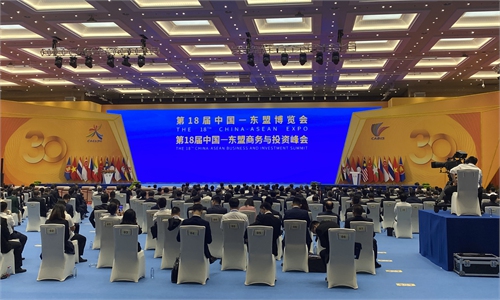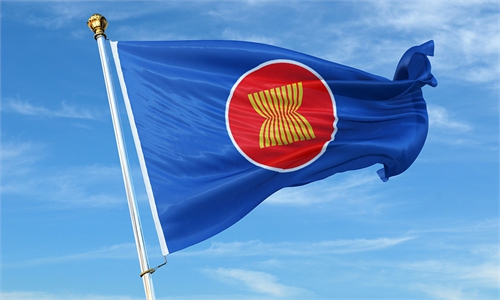Chinese FM Wang Yi starts tour in Southeast Asia to boost ties
Official visits show relations resilient to US efforts to destabilize region

Chinese State Councilor and Foreign Minister Wang Yi (left) bumps elbows to greet Vietnam's Deputy Prime Minister Pham Binh Minh prior to their meeting in Hanoi on Friday. Photo: AFP
Chinese State Councilor and Foreign Minister Wang Yi commenced week-long official tour in four neighboring countries on Friday with the first stop in Vietnam, aiming to boost bilateral ties and cooperation in a wide range of areas, as the US continues efforts to destabilize the region.
Coming just around two weeks after US Vice President Kamala Harris' trip in the region that sought to pit countries against China, Wang's trip showed that China and the neighboring countries are determined to enhance diplomatic relations, despite external interference, Chinese analysts said.
During his visit to Vietnam from Friday to Saturday, Wang is expected to co-chair the meeting of the 13th Steering Committee for Vietnam-China Bilateral Cooperation with Vietnamese Deputy Prime Minister and Foreign Minister Pham Binh Minh and hold bilateral talks, Vietnam News reported citing a spokesperson for the Vietnamese Ministry of Foreign Affairs on Thursday.
After Vietnam, Wang is scheduled to visit Cambodia, Singapore and South Korea.
Wang's visit to Vietnam, upon invitation of Vietnam's Deputy Prime Minister and Foreign Minister, comes after Harris's visit to Vietnam and Singapore last month, during which she sought to persuade the countries to step up pressure on China.
Xu Liping, director of the Center for Southeast Asian Studies at the Chinese Academy of Social Sciences, told the Global Times on Friday that Vietnamese leaders recognize the uniqueness of the China-Vietnam relationship and Vietnam's special relationship with China is irreplaceable and not comparable to its relationship with the US.
Just before Harris' visit, Vietnamese Prime Minister Pham Minh Chinh met with Chinese Ambassador to Vietnam Xiong Bo in his office and stressed that developing Vietnam-China relations is a top priority in Vietnam's foreign policy.
Xu noted that China and Vietnam, as socialist countries, share a similar political system, and that Wang's visit will further boost political mutual trust between the two countries, while continuing to devote efforts to manage differences and strengthen consensus on the South China Sea.
Bilateral communication and cooperation have also gained great momentum during the COVID-19 epidemic, as the two countries cooperated on epidemic control, vaccines and trade. Wang's visit will not only improve already-established cooperation but also prompt more cooperation following the COVID-19 pandemic, Xu said.
Commenting on Wang's visits to the four neighboring countries, the Chinese Foreign Ministry said on Tuesday that those countries are close neighbors and important partners and China will focus on cooperation in epidemic prevention, economic development, implementation of the Belt and Road Initiative and the construction of a community with a shared future for mankind.
The countries will also talk about defending multilateralism and maintaining global fairness, as well as regional peace and stability, the ministry said.
Gu Xiaosong, director of the ASEAN Institute of Hainan Tropical Ocean University in South China's Hainan Province, told the Global Times that despite the US' continuous containment efforts to pit neighboring countries against China, the friendly relationships between China and its neighbors will not be disrupted, as the countries know how to maintain a balance and are unwilling to choose sides between China and the US.
China and Southeast Asian countries have maintained robust economic and trade cooperation in a wide range of areas based on shared interests and such cooperation does not target any third party, Gu said, adding that the US' ill attempt to shake this kind of consensus and mutual trust is doomed to fail.
While global trade is at a low level due to the COVID-19 pandemic, China's trade with ASEAN continues to grow. According to the Chinese General Administration of Customs, China and ASEAN have become each other's largest trading partners. In 2020, ASEAN surpassed the EU to become China's top trading partner for the first time, showing strong resilience amid the sudden onslaught of the COVID-19 pandemic.
Also highlighting growing ties between China and Southeast Asian countries, prior to his week-long journey, Wang on Thursday met with Lao Foreign Minister Saleumxay Kommasith via video link, during which Wang stressed the need to boost China-Laos relations.



